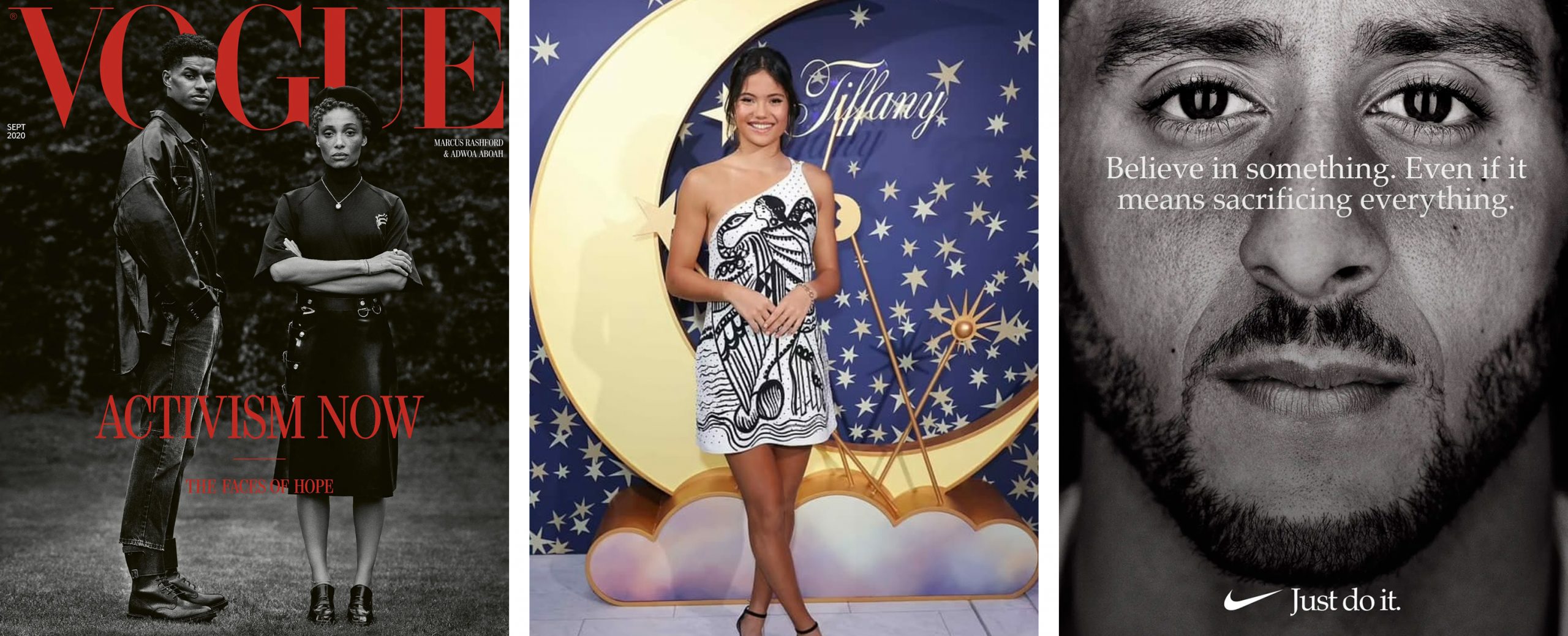Articles | Sports | Branding | Brand Values | Social Purpose
While sport is no stranger to individual athletes that are as popular (if not more) than the teams they play for or the sports they play, recent years have seen a significant change in the increased appeal of individual athletes both inside and outside of the sporting world.
From Emma Raducanu’s meteoric rise, becoming the face of Tiffany & Co following her US Open win, to the social-political activism of the likes of Colin Kaepernick or Marcus Rashford, sports stars are carving a new place in popular culture one that in many cases exceeds their stardom within the sporting world.

1 https://www.vogue.co.uk/news/article/september-2020-issue-editors-letter/
2 https://firstsportz.com/tennis-emma-raducanu-looks-sensational-at-tiffany-event/
3 https://www.newyorker.com/news/daily-comment/behind-nikes-decision-to-stand-by-colin-kaepernick/
The aforementioned athletes, to name but a few, demonstrate the personal brands being created within sport and how their sporting achievements are merely the starting block from which their wider appeal originates, opening them out to new audiences beyond sports fans.
“What does this mean for sports brands?” We hear you say.
Sports brands no longer represent just a team or sport. The demands placed on them by the fans are far greater, with sport increasingly being looked to for its potential to influence social and environmental change. A recent survey from Canvas8 suggested that 64%1 of sports fans felt that sports brands were likely to inspire positive change, 25% higher than their confidence in politics to do the same (39%). Couple this with the need for brands to have a rich life off the pitch (see our insights on sports brands in the mediaverse), it’s time that brands consider their impact and appeal in an increasingly complex world of fan engagement.
The environment, child poverty, racism, LGBTQ+ rights are just a handful of the causes that fans are now seeking teams to take a stance on. From creating more eco-friendly / sustainable stadiums or eradicating the use of plastic to creating platforms for charitable giving and making a stand against oppression within the sport, brands must explore how their brands can authentically and honestly take a position on the causes important to fans to ensure that their brands remain relevant.
So, you stop serving coffee in your stadiums with plastic lids and use the rainbow flag during pride, job done right? Wrong. Tokenism and greenwashing can be sniffed out by fans and consumers a mile away, they are savvy to these titbits of action from brands and want a response that grows, learns and continues to deliver.
Take for instance brands such as American fast-food giant Chick-fil-a who were criticised annually for their use of the rainbow flag during pride month, only to donate to anti-LGBTQ+ charities. The backlash eventually resulted in a change in donation strategy from the organisation following years of bad press. The question is had they considered the criticism from the perspective of their brand values, would the change have come sooner?
Developing, honing and implementing strategies surrounding these causes can be a lengthy process and while developing an environmental strategy may not appear to be directly part of your brand strategy, doing so in a way that is authentic to your brand is.
As seen with issues around tokenism, the lack of authenticity from brands also leaves a bitter taste in audiences’ mouths. A 2021 survey from Stackla found that 88%2 of audiences believe that authenticity is important when deciding which brands they like and support. Highlighting that acting or speaking in a way that is deemed inauthentic by your audience could be hugely detrimental to your brand.
“Tell us what we need to do!” We hear you cry.
Reviewing your brand strategy and ensuring your brand values are relevant for the modern world is work that should be reviewed periodically. Your brand values reflect what your brand stands for and how your brand conducts itself, while not every brand will need a radical overhaul of their brand strategy (including their values) many may find an adjustment to their strategy positions the brand to successfully make changes for the better. Ultimately ensuring that each brand’s response to the social and societal challenges is authentic for the brand and relevant to the audience.
Taking the steps to become a purpose-driven brand can pay dividends with your fans and help you to become an organisation ready for the future and prepared to deal with the next cause important to your fans.
Want to know if your brand is ready to face the challenges being thrown up by purpose-driven and socially conscious audiences? Check out our brand checklist to find out:
– Do your brand values provide you with an authentic voice when addressing social purpose or challenges?
– Does your brand strategy support the development of purpose-driven activities and activations?
– Does your brand positioning have the flexibility to adapt to new social and societal challenges?
If the answer is no or you are just not sure, it might be time to contact the Turquoise team to discuss your brand strategy and brand purpose. Get in touch.
"*" indicates required fields
*Required. By submitting this form, you agree to the use of your personal information as set out in our Privacy Policy